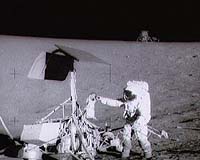 |
for Rosenberg Publishing Sydney, Australia (SPX) Apr 15, 2010 America's space program is clearly in a state of flux. After so much debate and announcements in recent months, we are still not entirely sure of what will happen in the next ten years. This is troubling to America's space community, but the repercussions are also being felt internationally. There is a large degree of interdependence among the world's space programs, and this is particularly strong in human spaceflight. The world's only space station is an international one. Soon, American astronauts will rely exclusively on Russian spacecraft to reach the station, and this dependence could extend for some time. While the world has focused on the controversial readjustments at NASA, there has been comparatively little attention on the issues faced by space programs in Europe and Japan. Both have major stakes in the International Space Station. Both will be strongly affected by the grounding of the Shuttle, and any other changes in American space policy. The lack of media attention on these issues is curious, but it's also true that ESA and JAXA really haven't said much in public to feed the reporters. This is understandable. Space planners are dealing with the pressures of the global financial crisis and dithering governments. The instability in America's own space policy makes it difficult to plan ahead. How can they react to something that isn't really tangible? The experiences of the world's major space powers in developing the International Space Station have been mixed. Bickering between the nations, especially Russia and America, has been quite vocal on occasions. The rationale and justification of such disputes is too complex to be explored in this article, but it's clear that major squabbles have dogged this project. Less vocal rumblings have emerged from other international partners. In recent years, we have also witnessed a confused and fruitless attempt to forge a partnership between Europe and Russia to develop a new manned spacecraft. Mistrust seems to be growing between major space powers on the future of human spaceflight. This mistrust is fuelled by concerns over budgetary commitments, the allocation of resources, and the management of projects. If this atmosphere of confusion is not dispelled in the next five years, a new trend will probably manifest in human spaceflight. There will be a greater emphasis on promoting autarky in space. Autarky is basically a condition of independence from external parties. In this context, it refers to the concept that major space agencies will seek to develop human spaceflight capabilities that remove their dependence on other major agencies. Basically, there could be a push for America, Europe and Russia to develop spacecraft, launch systems, orbital infrastructure and launch sites that are totally owned and controlled by a single agency. This will allow nations to launch their own missions without interference by other agencies. It will also allow them to pursue missions and overall programs that are themselves independent of other nations. This does not mean that spaceflight will be totally stovepiped and walled off between the nations. It merely suggests that there will be moves to avoid the complex and heavily interdependent web that exists today. The major powers should still co-operate on human spaceflight, and there's reason to believe that this will happen. Co-operation, however, is different from dependence. The growing trend of private space ventures suggests another angle to the future of international spaceflight. Nations with smaller indigenous space capabilities will simply buy or rent commercial space infrastructure, ranging from launch systems to space stations. The modus operandi will be similar to commercial aviation. Some nations with little aerospace industrial capacity have managed to operate some of the world's best commercial airlines. Similar trends could also appear in the space arena. This is an interesting time to be watching the rapidly evolving developments in global spaceflight. Nobody can really be sure of where we will be in another ten years, but it will probably be far more sustainable than the space programs of today. Dr Morris Jones is an Australian space analyst and the author of The New Moon Race, available from Rosenberg Publishing.
Share This Article With Planet Earth
Related Links Rosenberg Publishing Mars News and Information at MarsDaily.com Lunar Dreams and more
 Soviets Used US Lunar Photos To Plan Own Moon Mission
Soviets Used US Lunar Photos To Plan Own Moon MissionMoscow (RIA Novosti) Apr 13, 2010 The Soviet Union used U.S. photos of the Moon obtained by the secret service to plan its own lunar mission, a Russian space scientist told RIA Novosti on Monday. The race between the two superpowers to reach the surface of the Moon first was in full swing when Alexander Bazilevsky began work at the Lunar geology department of the Soviet space studies institute in Moscow. "We had to s ... read more |
|
| The content herein, unless otherwise known to be public domain, are Copyright 1995-2010 - SpaceDaily. AFP and UPI Wire Stories are copyright Agence France-Presse and United Press International. ESA Portal Reports are copyright European Space Agency. All NASA sourced material is public domain. Additional copyrights may apply in whole or part to other bona fide parties. Advertising does not imply endorsement,agreement or approval of any opinions, statements or information provided by SpaceDaily on any Web page published or hosted by SpaceDaily. Privacy Statement |